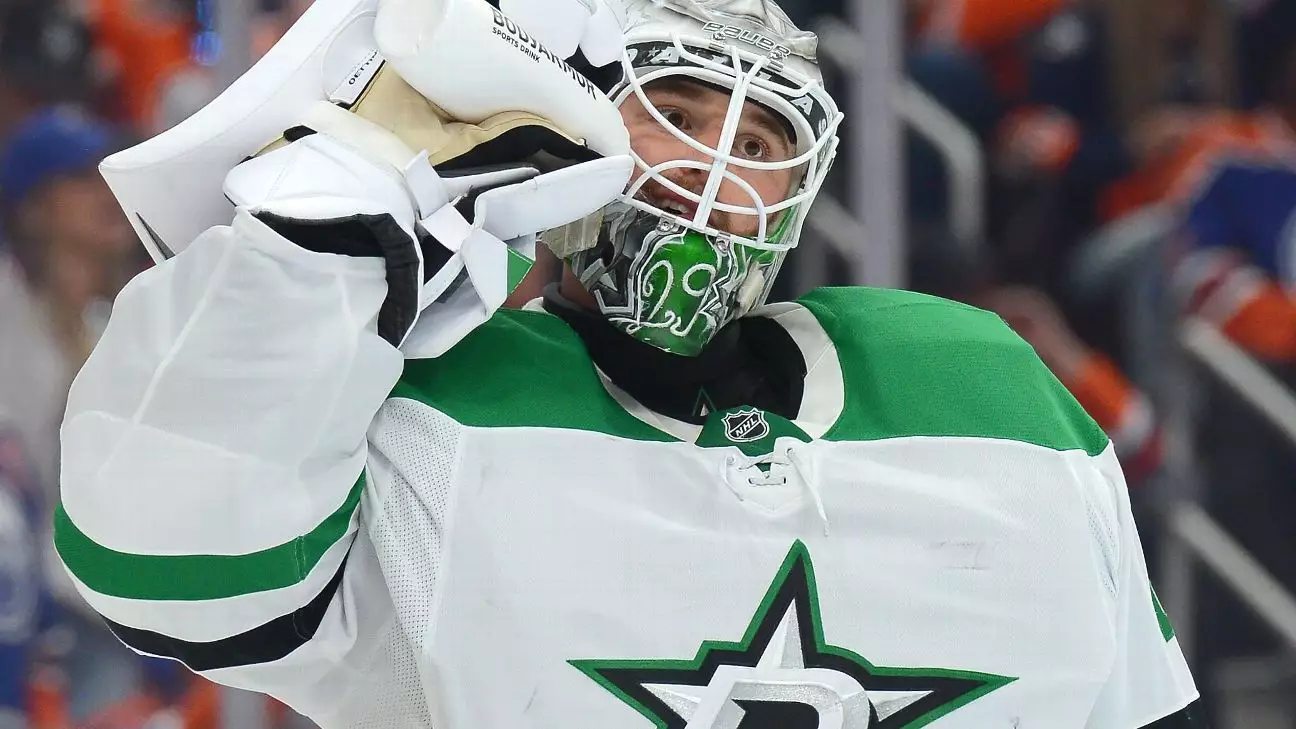In the high-stakes world of professional hockey, rarely can a moment define a player’s future prospects as starkly as a misstep during the playoffs. Jake Oettinger, the goaltender for the Dallas Stars, recently found himself at the center of a whirlwind of scrutiny following his abrupt exit from Game 5 of the Western Conference finals. When he was pulled after just over seven minutes, following a second goal conceded, Oettinger felt a cocktail of surprise and embarrassment wash over him. This incident encapsulates not only the burden of expectations that young athletes carry but also the intense scrutiny faced by team leaders, particularly in a market as vibrant as Dallas.
Oettinger’s experience is poignant; it starkly illustrates the dichotomy between a player’s perceived performance and the decision-making process of coaching staff under enormous pressure. Coach Peter DeBoer’s decision to replace Oettinger, justified by the tactical need to “stop the bleeding,” revealed the desperation that can pervade a playoff atmosphere. With the weight of a season hanging in the balance, decisions made in split seconds can reshape careers and reputations. Deciding to pull a player, especially one who has been relentlessly lauded as a top performer throughout the playoffs, hints at a broader strategy fueled by both past performance and present stress.
A Season of Trials
This was not Oettinger’s first dance with playoff adversity; having led the team through multiple seasons and series, he has consistently faced significant pressure. After each playoff campaign, he has demonstrated impressive resilience. In 2022, for instance, he achieved an extraordinary 64 saves against Calgary before an overtime defeat spelled the end of that series. His ability to fend off a relentless onslaught of shots—503 in a mind-boggling 18 games this postseason alone—serves as a testament to his talent and endurance in goal.
Despite these stellar numbers, the harsh reality of the sport remains that one bad moment can eclipse months of hard work. Oettinger finished this postseason with a hard-fought save percentage of .905 and a goals-against average of 2.82, skirting the edge of excellence while facing an onslaught of aggressive opposition. Yet, the playoffs demand more than just stats; they ask for emotional readiness and mental fortitude, both of which can sometimes falter under the immense pressure of imminent excision from championship contention.
The Cost of Leadership
The fallout from Game 5 has triggered a cascade of questions regarding Oettinger’s and DeBoer’s relationship. While the coach expressed continuing faith in his goaltender, the public narrative has ignited discussions “behind closed doors.” The unfortunate reality for players like Oettinger is that success is often framed by the whims of those who coach them. “I’m here to stop the puck,” Oettinger mentioned, emphasizing that his focus should remain on performance above all else. But in a system so heavily influenced by leadership dynamics, his mental space may become cluttered with uncertainties about loyalty and support.
Adding a layer of complexity, DeBoer’s decision-making was influenced by concerns about Oettinger’s physical fitness, aggravated by previous upper respiratory issues during the series. Rather than demonstrating reassurance, the coach’s choice could have subtly amplified Oettinger’s fears about his own physical readiness and mental acuity. Instead of fostering a solid working relationship in the fallout, the incident reflects a rift, however ephemeral, that could hinder team morale.
Learning and Growth From Adversity
While the outcome of the season was disheartening for Oettinger and the Stars, the prospect of self-reflection offers solace and an opportunity for growth. Oettinger spoke candidly about the lessons he could draw from this experience, acknowledging that each setback opens the door to improvement. Seasoning one’s craft through adversity is a principle deeply embedded in professional sports, and the ability to convert painful moments into learning experiences sets apart champions from the rest.
Feeling confident in his physical state, Oettinger remains focused on how to enhance his performance, suggesting that his mental resilience remains unshaken. His assertion that he can emerge as a better goalie through learning from mistakes encapsulates the indomitable spirit necessary for success in sports.
In a world where public opinion can shift overnight and scrutiny can overshadow performance, Jake Oettinger’s resolution to embrace this moment of vulnerability may lay the groundwork for an even more remarkable career ahead. The balance between player and coach dynamics constantly evolves, and it is through challenges like this that both parties could forge a more robust strategy for future triumphs.


Leave a Reply